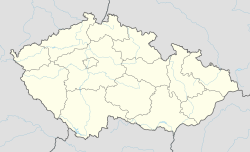Horní Domaslavice
| Horní Domaslavice | |||
|---|---|---|---|
| Village | |||

Church of Saint James the Greater
|
|||
|
|||
| Location in the Czech Republic | |||
| Coordinates: 49°41′42″N 18°27′48″E / 49.69500°N 18.46333°ECoordinates: 49°41′42″N 18°27′48″E / 49.69500°N 18.46333°E | |||
| Country | Czech Republic | ||
| Region | Moravian-Silesian | ||
| District | Frýdek-Místek | ||
| First mentioned | 1305 | ||
| Government | |||
| • Mayor | Zdeněk Janecký | ||
| Area | |||
| • Total | 5.05 km2 (1.95 sq mi) | ||
| Elevation | 320 m (1,050 ft) | ||
| Population (2011) | |||
| • Total | 681 | ||
| • Density | 130/km2 (350/sq mi) | ||
| Postal code | 738 01, 739 51 | ||
| Website | www |
||
Horní Domaslavice (Polish: Domasłowice Górne) is a village in Frýdek-Místek District, Moravian-Silesian Region, Czech Republic. It has a population of 650 (2008). The village lies in the historical region of Cieszyn Silesia.
The village was first mentioned in a Latin document of Diocese of Wrocław called Liber fundationis episcopatus Vratislaviensis from around 1305 as item in Domaslawitz utroque. It meant that there were already two villages of that name (utroque meaning both in Latin), the other being Dolní Domaslavice.
Politically the village belonged initially to the Duchy of Teschen, formed in 1290 in the process of feudal fragmentation of Poland and was ruled by a local branch of Piast dynasty. In 1327 the duchy became a fee of the Kingdom of Bohemia, which after 1526 became part of the Habsburg Monarchy.
The village became a seat of a Catholic parish, mentioned in the register of Peter's Pence payment from 1447 among 50 parishes of Teschen deanery as Domaslowicz.
After the 1540s Protestant Reformation prevailed in the Duchy of Teschen and a local Catholic church was taken over by Lutherans. It was taken from them (as one from around fifty buildings) in the region by a special commission and given back to the Roman Catholic Church on 24 March 1654.
...
Wikipedia



